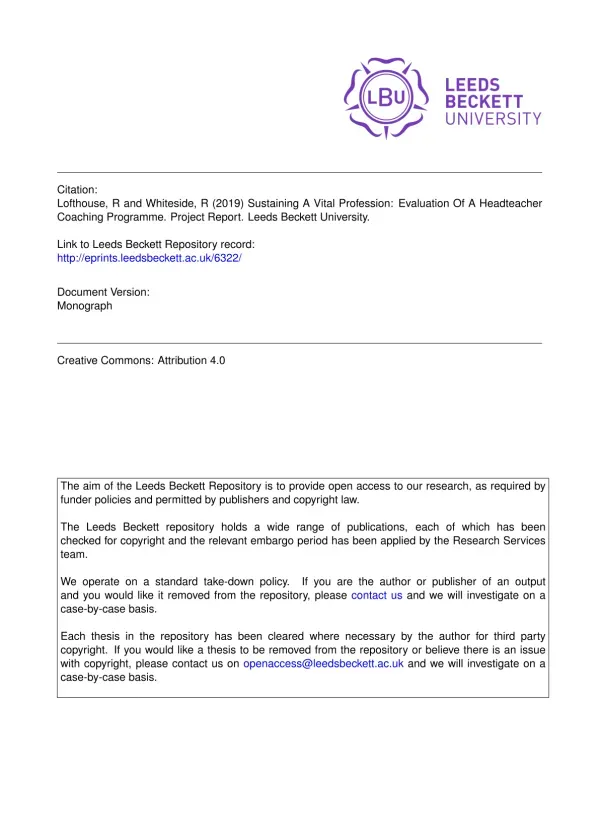
Evaluation of the Headteacher Coaching Programme at Leeds Beckett University
Document information
| Author | Professor Rachel Lofthouse |
| School | Leeds Beckett University |
| Year of publication | 2019 |
| Place | Leeds |
| Document type | project report |
| Language | English |
| Number of pages | 32 |
| Format | |
| Size | 586.96 KB |
- headteacher coaching
- educational leadership
- professional development
Summary
I. Introduction
The Evaluation of the Headteacher Coaching Programme at Leeds Beckett University serves as a comprehensive analysis of a year-long initiative aimed at enhancing the professional capabilities of headteachers. Conducted by CollectivED, the programme was funded by the National Education Union and implemented by Integrity Coaching. The report highlights the significance of coaching in addressing the unique challenges faced by headteachers, particularly in terms of resilience and emotional well-being. The evaluation draws on various data collection methods, including questionnaires and interviews, to assess the programme's impact. The findings indicate that coaching not only supports individual headteachers but also contributes to the overall health of the educational system.
II. Challenges of Headship
Headship presents numerous challenges that can lead to the erosion of resilience among educational leaders. The report identifies the emotional and professional complexities that headteachers encounter, which can significantly affect their well-being and work-life balance. The coaching programme aims to mitigate these challenges by providing a supportive environment where headteachers can explore their concerns without judgment. As noted in the report, 'Coaching supported headteachers to develop and maintain effective management approaches.' This highlights the importance of coaching in fostering resilience and promoting a healthier work environment for headteachers.
III. Impact of Coaching
The immediate impact of the coaching programme is characterized by a sense of optimism among participants. The evaluation reveals that headteachers reported increased self-belief and confidence as a result of their coaching experiences. The structured sessions allowed for focused reflection, enabling headteachers to prioritize their physical health and address feelings of isolation. The report emphasizes that 'Coaching had early benefits,' indicating that the programme's design effectively meets the needs of headteachers. This positive feedback underscores the value of coaching as a tool for personal and professional growth.
IV. Professional Development
Coaching plays a crucial role in enhancing professional practice among headteachers. The report outlines how the programme facilitates conversations that lead to clarity and actionable insights. By providing time and space for reflection, coaching enables headteachers to develop strategic leadership skills and create a clear road map for their institutions. The findings suggest that coaching not only improves individual capabilities but also fosters a culture of collaboration and empowerment within schools. This dual impact reinforces the necessity of coaching in the educational landscape.
V. Sustainability in Education
The coaching programme contributes to the sustainability of the education system by addressing headteacher retention. The evaluation indicates that coaching helps to build medium to long-term capacity within the profession. As headteachers develop their skills and confidence, they are better equipped to manage their roles and support their colleagues. The report states, 'There is evidence that this coaching programme had a positive impact on retention for headteachers at risk of leaving.' This finding highlights the broader implications of coaching for maintaining a stable and effective educational workforce.
VI. Conclusion
The Evaluation of the Headteacher Coaching Programme at Leeds Beckett University underscores the transformative potential of coaching in education. By addressing the unique challenges faced by headteachers, the programme fosters resilience, enhances professional practice, and supports the sustainability of the educational workforce. The insights gained from this evaluation provide valuable guidance for future initiatives aimed at improving leadership in education. The report serves as a testament to the importance of investing in coaching as a means to empower headteachers and ultimately improve educational outcomes.
Document reference
- Evaluation of a Headteacher Coaching Programme (Professor Rachel Lofthouse & Ruth Whiteside)
- Integrity Coaching (Integrity Coaching Team)
- National Education Union (National Education Union)
- CollectivED at Leeds Beckett University (CollectivED Team)
- Coaching Conversations: A Guide for Coaches (Coaching Experts)
